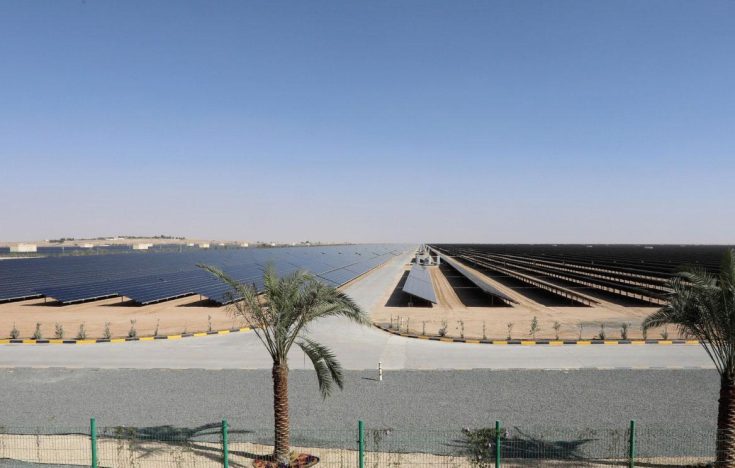Suhail bin Mohamed Al Mazrouei, the minister of energy and infrastructure of the United Arab Emirates (UAE), recently shared the country’s plan to generate more clean energy. The UAE particularly aims to have a total capacity of 19.8 gigawatts (GW) by 2030. He was speaking at the Abu Dhabi International Progressive Energy Congress (ADIPEC) 2023.
The event, which runs until October 5, has adopted the theme “Decarbonizing. Faster. Together.” for this year’s edition of the show.
Al Mazrouei emphasized during the “Fast Tracking the Energy Transition” panel that the UAE has “one of the fastest-growing clean energy industries in the world.”
Apart from its clean energy target, the minister revealed that the country “seeks to become a leading producer and supplier of low-carbon hydrogen.” The goal is to produce 1.4 million metric tons of low-carbon hydrogen per year by 2031 and 15 million metric tons per year by 2050.
Meeting energy demand
Apart from the UAE minister announcing the country’s clean energy efforts, the event also witnessed key officials share insights about the sector. In particular, Tayba Al Hashemi, chair of ADIPEC 2023 and chief executive officer (CEO) of Adnoc Offshore, pointed out the increasing energy demand.
“By 2030, the world will be home to an additional half a billion people, demanding more energy every year. At the same time, the global challenge of climate change calls for urgent, game-changing solutions to eliminate emissions,” she stated.
Al Hashemi further expressed that “every government, industry, business, and individual has a role to play in decarbonizing quicker, and creating the future of energy, faster, while safeguarding energy security and ensuring nobody is left behind.”
For her, the theme of ADIPEC 2023 “is a rallying call to the industry to work together to transform, decarbonize, and future-proof our industry. We want to accelerate the innovation and tangible actions needed to enable a lower-carbon and higher-growth future for the world.”
Read: UAE: OPEC+ eager to achieve stability, balance in the energy sector
Working together
The said panel also explored the importance of innovative policies and inclusive practices. These are not only vital in meeting energy demands but also, more importantly, in achieving net zero emissions. Participants unanimously acknowledged that governments play a pivotal role in driving collaboration and investment.
“We need to keep the politics aside, and as OPEC, work as a technical group,” UAE’s Al Mazrouei emphasized.
OPEC Secretary General Haitham Al Ghais echoed these remarks. “We have to have a clear roadmap of where we’re going, and how to get there,” he stated.

Meanwhile, Amin Nasser, president and CEO of Saudi oil giant Aramco, said, “At Aramco, we believe that energy security and sustainability can co-exist. We remain committed to helping supply the world’s growing energy needs as we also expand our efforts to develop lower-carbon solutions that will provide future generations with cleaner and more sustainable energy.”
Speaking at a panel on fast-tracking finance and prioritizing investments for the energy transition, Niall Hannigan, chief financial officer of Masdar, a renewable energy company based in Saudi, stressed that “investors need scale.” “Investors need scale.
“They want to see a clear policy framework within a geography, underpinned by a stable, transparent regulatory regime. Governments won’t attract investors alone – we need regulators, developers, development banks, and commercial banks in the room together to create a program. That collaborative conversation is essential,” he added.
Lucian Boldea, president and CEO of Honeywell Performance Materials & Technologies, also touched on the importance of partnerships. He shared, “When you look at the energy transition and decarbonization, there haven’t been any breakthroughs in the past year. The tools, the technology, and the willpower are there. Looking ahead, it’s partnerships that are needed now to unlock the industry’s potential.”
More event highlights
ADIPEC 2023 also witnessed the inaugural hydrogen strategic conference, which talked about the mainstream use of hydrogen.
Dr. Saleh Al Kharabsheh, Jordan’s minister of energy and mineral resources, shared the country’s efforts to heighten energy security. With the country’s strategic location in the region, it has also inked partnerships with Egypt, Syria, and Palestine.
Al Kharabsheh also revealed that Jordan is also aiming to boost ties with Saudi Arabia. Currently, they have an Arab gas pipeline that can be used to transport natural gas.
ADIPEC is the biggest energy exhibition and conference in the world. For this year, it has over 1,600 speakers, including government ministers, CEOs, and energy experts, among others. Over the course of four days, the event will host ten conferences. These will cover a range of themes, from expanded strategic decarbonization to mobilizing finance and investments.
For more energy news, click here.








